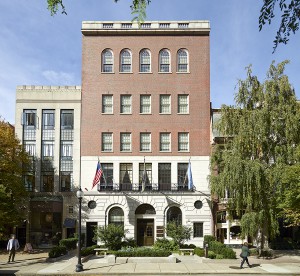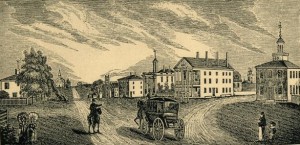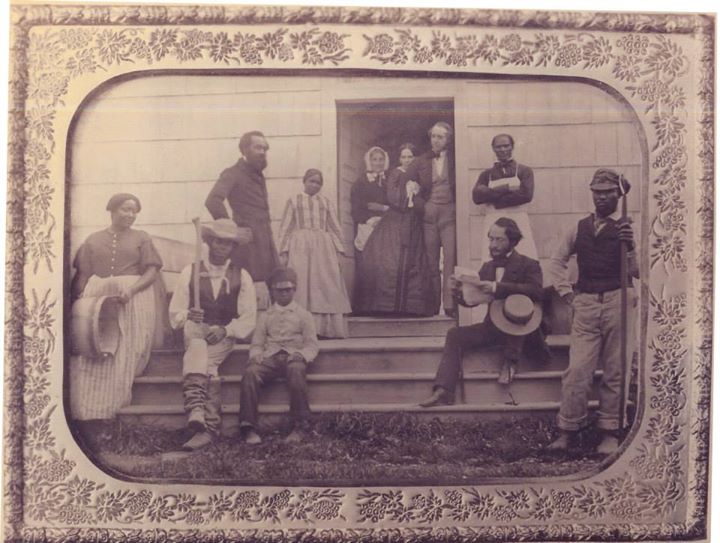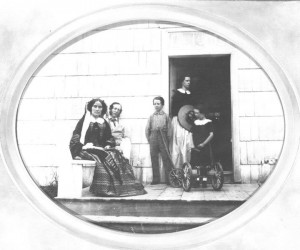 Many Americans are familiar with the popular and scenic Ring of Kerry in Ireland. They might be less familiar with a peninsula just to the south, in County Cork, called Beara. Those who are attempting to trace their roots to the Beara Peninsula are among the most fortunate genealogical researchers in the world, thanks to the monumental work carried out by a teacher (and genealogist, historian, footballer, and champion accordion player) named Riobard O’Dwyer. O’Dwyer, who was born in the U.S. to Beara parents but grew up in Beara, took it upon himself to study the families of the peninsula as comprehensively as possible. He spent the better part of his life visiting the localities of Beara, gaining access to and transcribing its (sometimes nearly illegible) church records, interviewing its residents, and examining the headstones of its cemeteries. Continue reading A new Irish records database
Many Americans are familiar with the popular and scenic Ring of Kerry in Ireland. They might be less familiar with a peninsula just to the south, in County Cork, called Beara. Those who are attempting to trace their roots to the Beara Peninsula are among the most fortunate genealogical researchers in the world, thanks to the monumental work carried out by a teacher (and genealogist, historian, footballer, and champion accordion player) named Riobard O’Dwyer. O’Dwyer, who was born in the U.S. to Beara parents but grew up in Beara, took it upon himself to study the families of the peninsula as comprehensively as possible. He spent the better part of his life visiting the localities of Beara, gaining access to and transcribing its (sometimes nearly illegible) church records, interviewing its residents, and examining the headstones of its cemeteries. Continue reading A new Irish records database
“Boston people do not like such nonsense”

Early in the year, in the midst of a particularly terrible cold snap, Mrs. Gray recalls the winter of 1844, shortly before her marriage:[1]
1 Beacon Hill Place, Boston, Saturday, 20 February 1875: Thirty-one years ago the English Steamer was released from Boston Harbour, by the cutting of a channel through the ice __ miles long, to liberate it, and I well remember, being then a visitor at Mr. Josiah Bradlee’s[2] [house] in Pearl St., the excitement about it… Continue reading “Boston people do not like such nonsense”
ICYMI: Jump starting your genealogical research
[Author’s note: This blog post originally appeared in Vita Brevis on 19 December 2014.]
 Consider sending a holiday letter out via email to your relatives. Then print a copy for posterity. – David Allen Lambert Continue reading ICYMI: Jump starting your genealogical research
Consider sending a holiday letter out via email to your relatives. Then print a copy for posterity. – David Allen Lambert Continue reading ICYMI: Jump starting your genealogical research
Thank an antiquarian

Genealogists and historians of Massachusetts are indebted to the works of nineteenth-century antiquarians: that is, compilers or collectors of historical information and antiquities. The works of several antiquarians – including John Warner Barber, Samuel Gardner Drake, and John Haven Dexter – have become crucial reference works in the study of Massachusetts genealogy. Knowing what these sources contain, along with their respective shortcomings, can be helpful when researching your Massachusetts ancestors. Continue reading Thank an antiquarian
Education by camper
 For reasons never fathomed or entered into by me, my parents loved to camp and travel. Mom’s mother called her a gypsy for following my Army dad around (they lived in nineteen places in the first 25 years of their marriage). My two older brothers got most of the tent camping phase, although I had my share, too. It was my fate alone, however, to participate in the motorized “camper” (i.e., recreational vehicle) phase.
For reasons never fathomed or entered into by me, my parents loved to camp and travel. Mom’s mother called her a gypsy for following my Army dad around (they lived in nineteen places in the first 25 years of their marriage). My two older brothers got most of the tent camping phase, although I had my share, too. It was my fate alone, however, to participate in the motorized “camper” (i.e., recreational vehicle) phase.
When I was in high school we moved from Massachusetts to St. Paul, Minnesota, because it was where my Dad could find work in 1962. RV trailers, like those silver torpedo things, were around, but Dad found someone who was outfitting what I used to call a “bread truck” body as a drivable camper. Continue reading Education by camper
Solving a mystery?
 I have written several blog posts on the contents of my grandfather’s box of family papers, but even this seemingly inexhaustible resource must eventually run dry. I don’t think I’m quite there, yet, although it’s true that I am reaching the tail end of the easily identified documents and photographs. Now for one or two remaining mysteries. Continue reading Solving a mystery?
I have written several blog posts on the contents of my grandfather’s box of family papers, but even this seemingly inexhaustible resource must eventually run dry. I don’t think I’m quite there, yet, although it’s true that I am reaching the tail end of the easily identified documents and photographs. Now for one or two remaining mysteries. Continue reading Solving a mystery?
ICYMI: Historic occupations
[Editor’s note: This blog post originally appeared in Vita Brevis on 12 November 2014.]
 While writing my blog focusing on archaic medical terms a few months ago, I began thinking about other aspects of everyday life that appeared in records used by genealogists. One element of an individual’s life which appeared on everything from wills to land deeds to town records was occupation. While some of the occupations listed on records throughout the last four hundred years still exist today (farmers, blacksmiths, and wood workers, to name a few), many of these jobs either are known by a different name or are entirely obsolete in modern society. Continue reading ICYMI: Historic occupations
While writing my blog focusing on archaic medical terms a few months ago, I began thinking about other aspects of everyday life that appeared in records used by genealogists. One element of an individual’s life which appeared on everything from wills to land deeds to town records was occupation. While some of the occupations listed on records throughout the last four hundred years still exist today (farmers, blacksmiths, and wood workers, to name a few), many of these jobs either are known by a different name or are entirely obsolete in modern society. Continue reading ICYMI: Historic occupations
Buckman’s Tavern

Along with the Boston Marathon and a home Red Sox game, today Massachusetts observes Patriots’ Day. This holiday, the third Monday in April since 1969, commemorates the Battle of Lexington on 19 April 1775.[1] In Lexington, the reenactment of the battle begins in the early morning hours as the Regulars – the British soldiers – march toward the town’s Common, and the militia company exits the adjacent Buckman’s Tavern to gather on the Common, now known as Battle Green. Continue reading Buckman’s Tavern
An unusual family

It is always a nice surprise to open a book and find a reference to a family member, especially a family member about whom one knows little. This recently happened to me as I was reading Robert Winthrop Kean’s memoir, Fourscore Years, published privately in 1974. The book’s subtitle, “My First Twenty-four,” indicates that this volume covers the beginning of the author’s life; an earlier book, Dear Marraine, concerns his service during the First World War.
Winthrop Kean’s mother was Katharine Taylor Winthrop (1866–1943). Her “most intimate girlhood friend,” Katie Stuyvesant, was my grandfather’s first cousin. Continue reading An unusual family
“A good many sharp speeches”

1 Beacon Hill Place, Boston, Monday, 16 January 1860: Fanny Gray[2] came to take tea – [she] played some sweet airs on the piano, with a great deal of feeling – and described a number of fancy ball dresses for Mrs. C. Amory’s[3] next Thursday.
Sunday, 22 January 1860: Have heard of little else than the [Amorys’] fancy ball – it was a grand success and kept up until 5 a.m. Continue reading “A good many sharp speeches”